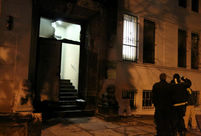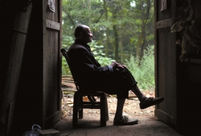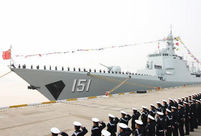 Famous Lanzhou beef noodles
Famous Lanzhou beef noodles Armed Police hold anti-terrorism drill in SE China's Xiamen
Armed Police hold anti-terrorism drill in SE China's Xiamen Harbin Int'l Ice and Snow Festival opens
Harbin Int'l Ice and Snow Festival opens 'Jin' named the word of the year by cross-strait netizens
'Jin' named the word of the year by cross-strait netizens Chinese scientific expedition goes to build new Antarctica station
Chinese scientific expedition goes to build new Antarctica station
 Chinese naval escort fleet conducts replenishment in Indian Ocean
Chinese naval escort fleet conducts replenishment in Indian Ocean 17th joint patrol of Mekong River to start
17th joint patrol of Mekong River to start China's moon rover, lander photograph each other
China's moon rover, lander photograph each other |
| Mao Anying, the son of Chairman Mao Zedong, died during the Korean War and is buried in the Democratic People's Republic of Korea. Du Baiyu / Xinhua |
Democratic People's Republic of Korea: During the Korean War (1950-53), 183,108 Chinese volunteers sacrificed their lives, according to records from a Chinese memorial hall.
In 1953, the Chinese government allocated funds to build eight cemeteries.
The biggest in the Democratic People's Republic of Korea is the Chinese People's Volunteers Army Cemetery of Revolutionary Martyrs, covering an area of 90,000 square meters and located in the volunteer army headquarters.
In addition, the DPRK has also built 62 such cemeteries.
Vietnam: The Chinese martyrs list of the Vietnam War, compiled in 2005 by the Chinese embassy in Vietnam, shows that from 1951 to 1976, 1,446 Chinese people died and were buried in Vietnam. They were buried in 40 revolutionary cemeteries built in 22 provinces and municipalities in northern and central regions.
Laos: In the 1960s, 215 Chinese soldiers died while helping local people resist foreign aggression as they tried to gain national independence. In 2010, a Chinese company responsible for a highway construction project in northern Laos voluntarily cleaned and restored two cemeteries. The Chinese embassy there said the cemeteries were in a poor region and local governments were lacking in maintenance funds.
Myanmar: The fortunes of the Chinese Expeditionary Force in Myanmar during World War II has been a topic of increasing interest in recent years. The force was made up of soldiers sent to Myanmar to fight against the Japanese invasion and about 100,000 Chinese soldiers died.
In their first battle in 1942, 60,000 soldiers died, but because of the constant fighting, it was difficult to formally bury their remains during the conflict. Their tombs were situated mainly along the Stilwell Road, which provided a strategic wartime link to China.
However, nearly all the tombs were destroyed in the 1950s for political reasons.
Tanzania: A cemetery for Chinese technicians and specialists assisting Tanzania's development is located in the west of Dar es Salaam, Tanzania's largest city.
In the cemetery, 69 Chinese engineers and workers have been laid to rest, including 51 who died building the Tanzania-Zambia railway in the 1970s. The youngest was only 22. The other 18 died on other cooperation projects. This is the largest Chinese cemetery of its kind in Africa.
In March 2013, President Xi Jinping visited the cemetery to pay his respects to those who died for the cause of China-Tanzania and China-Africa friendship.

 Chinese Consulate General in S.F. burned for arson attack
Chinese Consulate General in S.F. burned for arson attack Roar of J-15 fighter is melody for operator on the Liaoning
Roar of J-15 fighter is melody for operator on the Liaoning A 90-year-old forester's four decades
A 90-year-old forester's four decades Most touching moments in 2013
Most touching moments in 2013 2013: Joys and sorrows of world politicians
2013: Joys and sorrows of world politicians Missile destroyer Zhengzhou commissioned to Chinese navy
Missile destroyer Zhengzhou commissioned to Chinese navy China is technically ready to explore Mars
China is technically ready to explore Mars Photo story: Life changed by mobile technology
Photo story: Life changed by mobile technology Bullet train attendants' Christmas Eve
Bullet train attendants' Christmas Eve Heart-warming Laba porridge
Heart-warming Laba porridge Gallery: China's trapped icebreaker makes successful escape
Gallery: China's trapped icebreaker makes successful escape Photo story: We are special soldiers
Photo story: We are special soldiers 'Rong' selected HK's character of the year for 2014
'Rong' selected HK's character of the year for 2014 Famous Lanzhou beef noodles
Famous Lanzhou beef noodles Chinese Consulate Arson Suspect Makes 1st Court Appearance
Chinese Consulate Arson Suspect Makes 1st Court AppearanceDay|Week|Month